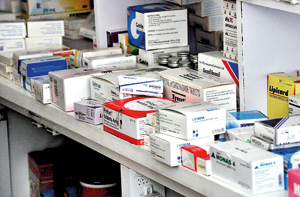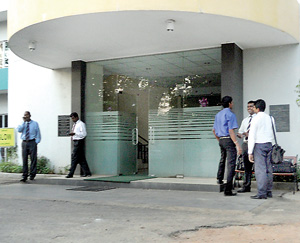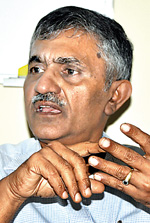Nearly four decades after Prof. Senaka Bibile formulated the ‘National Medicinal Drug Policy’ and six years after the cabinet approved it, the much anticipated policy is to be introduced early next year, the government says.
 |
| The bills will not only control prices, but also regulate and monitor medicinal drugs imported and manufactured in the country and enforce strict surveillance on drugs smuggled to the country |
Health Minister Maitripala Sirisena announced in Parliament that three new bills would be introduced in Parliament that not only control prices, but also regulate and monitor medicinal drugs imported and manufactured in the country as well as enforce strict surveillance on medicines smuggled into the country.
According to the minister, a Drug Regulatory Authority Bill would be introduced and the Authority would serve as an umbrella body. Of the three new supportive bills to be introduced are the National Medicinal Drugs Bill and the Clinical Trials Bill while discussions are being held to introduce the third that would bring the existing Cosmetic Devices and Drug Regulatory Authority under the new Drug and Regulatory Authority.
The National Medicinal Drugs Act will cover price controls and evaluation of medicinal drugs that would ensure efficacy, safety and quality at an affordable price.
The Clinical Trials Bill would be introduced to attract researchers in the field of medicine and pharmaceuticals to the country to conduct medical research along with local consultants.
 |
| Medical reps stand outside a private hospital in Colombo. Pix by Indika Handuwela |
The bills are being drafted by the Ministerial Committee headed by former Direcor General Health services Dr. A.M.L. Beligaswatte and will be handed over to the Legal Draftsmen’s Department soon, the Sunday Times learns.
Meanwhile, the issue of the control of prices of medicinal drugs has created debate among the medical fraternity, the pharmaceutical industry, academics and general public.
The last pricing formula by the Fair Trading Commission in 1989 permitted a maximum retail price that was not more than a 65 per cent increase of the cost at which the drug is imported. This included Cost, Insurance and Freight (CIF) charges.
This pricing formula lapsed in 2002 and no new formula has been gazetted since then, the Sunday Times learns.
R. Lal Jayakody, Professor in Clinical Pharmacology, Department of Pharmacology at the University of Colombo said as the pricing formula was not strictly ienforced the prices of individual medicines were decided by importers, manufacturers and individual pharmacy owners.
“The Indian Journal of Pharmacology 2011 carries a report on ‘Medicine Prices, availability and affordability’ compiled by several eminent parties in the Sri Lankan medical fraternity, This report states that in Sri Lanka generic medicines have an effective pricing formula and are available and affordable. In contrast, innovator brands are higher than the effective pricing and are not affordable,” he said.
It is also estimated that the private sector accounts for between 50-60 percent of out-patient care.
“Today medicines are important to our lives as the food we consume and almost all of us are under some medication. There is an increase in out-of-pocket expenses especially for lab tests and medicinal drugs. Prescribing patterns are also changing. But we cannot let market forces determine drug prices,” he said.
 |
| Prof. Jayakody. Pic by Mangala Weerasekera |
He said the latest trend is an increase in the consumption of biological drugs more than chemical drugs. Biological drugs are made from a living organism such as cells, bacteria, yeast or its products and are used in the prevention, diagnosis, or treatment of cancer and other diseases such as rheumatoid arthritis, irritable bowel syndrome and asthma.
The biggest concern is the cost as there are hardly any generic versions of these drugs and therefore there is a monopoly over the pricing with only a few being able to buy such drugs, Prof. Jayakody said.
Since 1984 13,000-14,000 medicinal drugs have been registered in the country. There are 30 different brands of Amoxycillin (a commonly used antibiotic) and more than 10 brands of Paracetamol, the Sunday Times learns
Citing an example Prof. Jayakody said the market has about 10 brands of Diazepan , a popular painkiller. The issue of quality comes into question where there are many brands of one drug. “Therefore drugs coming in to the country should be regulated,” he said.
Sri Lanka has only one state manufacturing plant run by the State Pharmaceutical Manufacturing Corporation and about 8-9 private sector manufacturers. About 70 kinds of drugs are manufactured in Sri Lanka.
State Pharmaceutical Corporation General Manager, Danusha Dassanayake said that the SPC supports the decision to introduce price control as patients will be able to purchase pharmaceuticals at reasonable prices.
“Importers, wholesalers as well as the retailers will not be able to have extraordinary margins and therefore prices of monopoly products, products supplied by a few suppliers will certainly go down,” he said.
Cosmetic Devices and Drugs Regulatory Authority Director Dr. Hemantha Beneragama said the authority registers all medicinal drugs and is vested with the power to raid and inspect drugs. He pointed out that there was an increasing trend of costly drugs being smuggled into the country.
“Anti-cancer drugs and other expensive drugs are smuggled into the country, therefore it is important to control the prices of these drugs,” he said.
Though it is not compulsory he said prior to registration certain drugs are tested for their quality by the National Quality Assurance Laboratory. “The laboratory does not have facilities to test all varieties of drugs. Therefore the facilities at the lab should be expanded. It is also important to increase the cadre of the Cosmetic Devices and Drugs Regulatory Authority so that pharmacies can be inspected regularly to check whether price regulations are being followed,” he said.The Government Medical Officers Association (GMOA) also supports the move to control the prices of medicines despite accusations levelled against many doctors for being influenced by transnational drug companies.
GMOA spokesman Dr. Upul Gunasekare said 99 percent of the doctors of the GMOA see a need for regulations as corruption is on the increase while low quality medicines are being imported to the country.
He said a regulation was introduced some time back that doctors issue generic prescriptions but it didn’t work as the majority of the general public did not know the generic names. “Generic prescription was a failure as there was no implementing policy. And as there are so many varieties of drugs in the market pharmacists would decide which brand should be given to the patients,” Dr. Gunasekare said.
He stressed the need to establish a drug information centre where the public can inquire about the medicines that have been prescribed to them.
Association of Community Pharmacists president G.G. Ratnasiri also voiced his approval for price control, saying it was a good move as there would be a standard price at all pharmacies.
“Importers also opt for the more expensive brands to cheaper generic alternatives to maintain a high profit margin,”he said.
Meanwhile a spokesman for the People’s Movement for the Rights of Patients said the main aim of Prof. Senaka Bibile’s policy was to make available quality drugs to the people at an affordable price.
“The Minister has promised to implement the policy and bring in price regulations. The cost is an important factor along with quality, efficacy and safety,” he said.
He said there were about 10,000-12,000 pharmacies in the country out of which about 7000 were illegal pharmacies.
“It is also important to continue with the inspection of pharmacies as it is necessary that pharmacies should have qualified pharmacists at all times,” he said.
He added that the country could save foreign exchange by stopping the import of hundreds of non-essential varieties of drugs and start manufacturing them here.
But the decision to implement price controls has its share of critics too.
Sri Lankan Chamber of Pharmaceutical Industries warns that price regulation, if implemented in the local market may lead to reputed suppliers withdrawing due to unattractive market conditions thereby causing a shortage of essential pharmaceuticals.
The Chamber also stressed that competition would reduce due to a lesser number of suppliers, which would lead to price increases. This could lead to stock shortages of pharmaceuticals in the country.
“Under the present system, where demand and supply forces act on a free and open market, prices are controlled by economic forces which not only allow a choice to the patient, but are knitted into the fabric of the country’s healthcare system. This very reason may cause pharmaceutical prices to further escalate under price regulation and for high quality innovator drugs to become scarce in the market,” a statement issued by the Chamber stated.
The Sri Lanka Pharmaceutical Manufacturers Association (SLPMA) also expressed its concerns on the proposed price regulation on pharmaceuticals by the Government.
SLPMA president Shalutha Athauda in a statement said incentives given to local drug manufacturers in the last budget proposals would be counterproductive if price regulation was imposed.
“The budget incentives which included tax holidays for new investments, concessionary tax for investors, buyback guarantees and a dedicated pharma zone, would be of no use in a noncompetitive market,” it said. |




